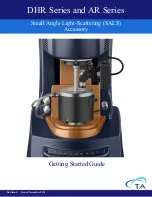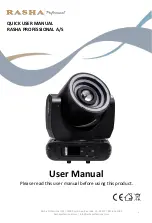
7
TM
85809
SAFETY
the engine is equipped with an electric starting system.
• Do not strike the flywheel with a hammer or any
hard object. This may cause the flywheel to shatter in
operation.
• Pull the starter cord slowly until resistance is felt. Then
pull the cord rapidly to avoid kickback and to prevent
hand or arm injury.
• Do not run the engine in an enclosed area. The
exhaust gases contain carbon monoxide, an odorless
and deadly poison. The engine exhaust from this product
contains chemicals known to the State of California to
cause cancer, birth defects or other reproductive harm.
• Do not store, spill, or use gasoline near an open flame,
nor near an appliance like a stove, furnace, or water
heater that uses a pilot light or can create a spark.
• Do not refuel indoors or in an unventilated area.
Check the fuel level. Do not over fill. Do not add fuel
while the machine is hot because spilled fuel may cause
a fire. Allow the engine to cool before refueling.
• Do not transport the machine with fuel in the tank.
• Do not remove the fuel tank cap or fill the fuel tank
while the engine is hot or running.
• Do not operate the engine if gasoline is spilled,
when the smell of gasoline is present, or when other
explosive conditions exist. Move the equipment away
from the spill and avoid any ignition until the gasoline
has evaporated.
• Do not choke the carburetor to stop the engine.
Whenever possible, gradually reduce the engine speed
before stopping.
• Do not tamper with the governor springs, links or other
parts to increase the engine speed. Run the engine at
the speed set by the equipment manufacturer.
• Do not check for a spark with the spark plug removed.
Use an approved tester. Use the correct tools to service
the machine.
• Do not crank the engine with the spark plug removed.
If the engine is flooded, place the throttle in fast and
crank until the engine starts. Avoid damage to electric
starter by cranking intermittently until engine starts.
• Do not operate the machine without a muffler. Inspect
the muffler periodically and replace it if it is leaking or
worn. Replace it with correct muffler. Do not touch a hot
muffler, cylinder, or cooling fin.
• Do not operate the engine with an accumulation
of grass, leaves, or other combustible material in the
muffler area.
• Keep the cylinder cooing fins and the governor parts
free of dirt, grass, and other debris.
• Do not use the engine on any forest covered, brush
covered, or grass covered unimproved land unless a
spark arrester is installed in the muffler. In the State
of California, a spark arrester is required by law. Other
states may have similar laws. Federal laws apply on
federal lands.
• Do not start the engine with the air cleaner or the air
cleaner cover removed.
• Use fresh gasoline. Stale fuel can gum the carburetor
and can cause leakage. Check the fuel lines and fittings
frequently for cracks and leaks.
• Do not operate any equipment at unsafe speeds.
Speeds should be reduced when turning or operating
on slopes. The operator must use common sense to
determine a safe speed based on the equipment, the
load, the slope, the surface, and other conditions that
may affect safe operation.
• The operator must be aware of the conditions around
the area. Be aware of other people and machines.
• Beware of slippery conditions. Wet turf can be
encountered on slopes, when turning or stopping, or at
higher speeds.
• Keep hands and feet away from cutting devices and
drive components. Shut off the engine and remove the
key or ignition wire when servicing cutting devices or
drive components.
• If required to lift, an operator should ask for help if
the object is too heavy. The operator should lift with his
or her legs instead of the back. Care should be taken to
avoid twisting the back while lifting a heavy load.
• Never allow children to operate the machine.
THE MACHINE:
•
Tow vehicles must have adequate tow hitches
and brakes to control any towed machine. Check
the weight and capacity of the machine that will be
towed by that vehicle.
Trucks used to carry equipment
must have adequate load capacity and brakes. Check
the weight and capacity of the machine that will be towed
by that vehicle.
•
Do not overload machinery. The components
are designed for certain weights and capacities.
Overloading the machine will cause unsafe
conditions.
• Make sure the brakes are operating properly.
• Check to assure that all controls are in good operating
condition.
• Inspect to insure that all guards are in place. Do not
operate a machine without all guards in place.
• Always check the machine to make sure it is in good
working order. Do not place hands or feet near moving
or rotating parts.
• Check the tire pressure.
• Check the condition of the hydraulic hoses. Leaks
and worn hoses should be fixed or replaced before the
machine is put into service. Do not use your fingers or
hands to check for hydraulic leaks. High pressure leaks
can puncture the skin and force oil into the body. This
can cause severe injury or death.
• Shut off the engine before servicing the machine. It is
best to check machines on a level area. Machines on a
slope may roll when the engine is off.
• Do not modify the machine in any manner. Refer
unfamiliar repairs and adjustments to mechanics that
have been trained to do them properly.
• Replace decals that are damaged or unreadable.
THE ENGINE:
• Prevent accidental starting by removing the spark
plug wire when servicing the engine or the equipment.
Disconnect the negative wire from the battery terminal if








































